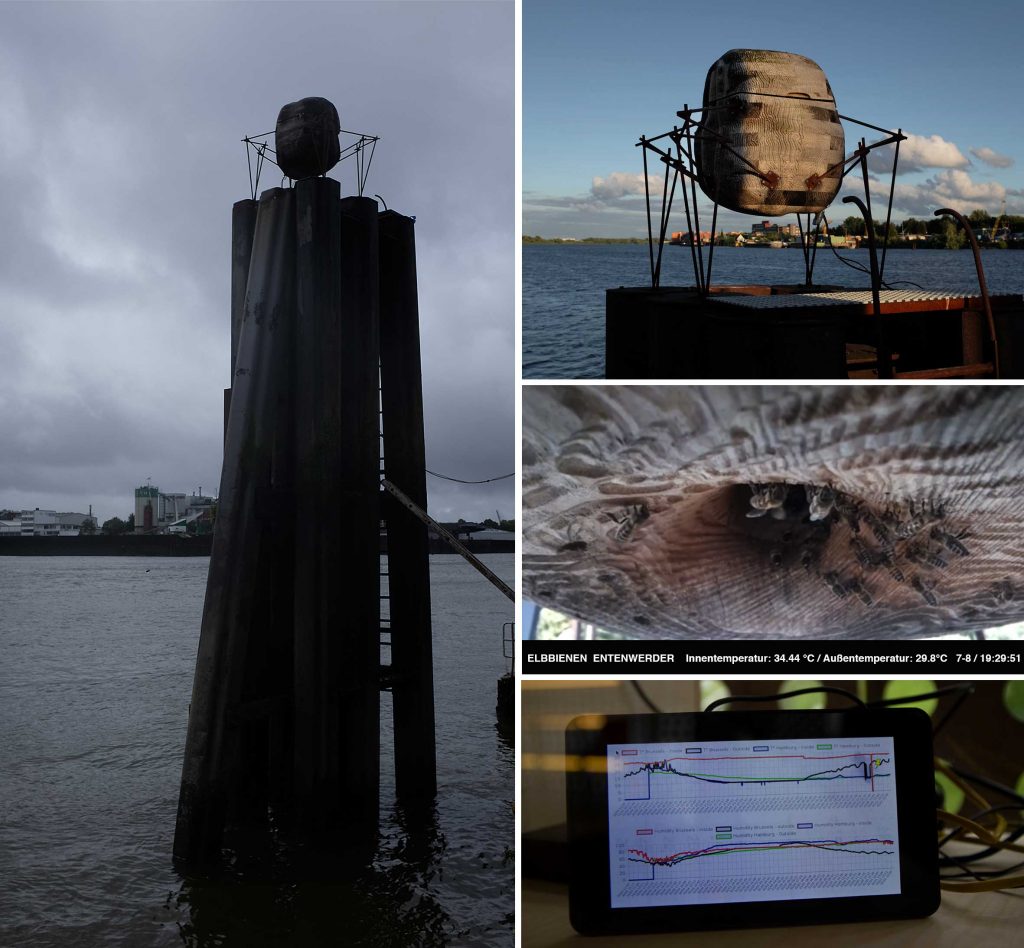In 2019, Dirck Möllman, Hamburg’ city curator, invited AnneMarie Maes for his Urban Art project the Hamburg Maschine (Hamburg Machine), which draws on topics as: ‘What functions can art in future public space have?’ and ‘What meaning will art obtain in a technological society?” The work of AnneMarie Maes fits perfectly to make a complex city feasible and graspable as a machinical texture. She visualizes and exemplifies these big questions gives them an artistic materiality enhanced by modern technology. Her work makes abstract thinking sensible and perceptible for the public with a high artistic quality in order to create a place for discussion, contemplation and reflection of socio-technological issues.
ElbBienen is a research project on the edge of art and science. It evokes issues of sustainability and biodiversity, giving viewers an artistic experience of Annemarie Maes’ ongoing research related to the disappearance of the honeybee. The goal of the ElbBienen-beehive is a double one. On the one hand it offers a safe refuge for city honeybees, and on the other hand it is a biosensor that interacts with the environment and that measures the pollution of the foraging fields around the beehive. Therefore, the ElbBienen project explores ecological aspects of digitality in the context of Hamburg Maschine, a metaphor of the city as a machine in the digital age. Animal life, especially bees, are essential for the functioning of a social community. Certain organisational forms of social collectives have been compared with the functioning of bee colonies, e. g. as Joseph Beuys did with his notorious Honigpumpe at Documenta 6 in Kassel, 1977. To connect advanced technology with a living biosystem like a beehive is an inspiring way of exploring innovative modes of interaction and interfacing between artificial machinist, classical human and instinctive animal intelligence for the future.

ElbBienen is a public-space art project in the Hamburg harbour, installed on a pile mooring in the Elbe river. A living bee colony is housed in a wooden body -a new kind of sensorial skin- sculpted by digital fabrication tools and equipped with sensors. The data, processed using AI, is displayed to the public. (images © 2020, AnneMarie Maes)
ElbBienen, reset dd. 9/10/11 July 2020. Realtime stream & information: https://elbbienen.annemariemaes.net
The commissioned version of ElbBienen is a bio-tech installation customized for public space in Hamburg. The ElbBienen-beehive, populated with a living bee colony, is installed on top of a pile mooring in the Elbe river at the Entenwerder Golden Pavilion. The ElbBienen project delivers new interfaces as e.g. a Sensorial Skin, given form by sculptural handling with digital machines, for the needs of bees at the Elbe river-location.
After more than ten years of artistic and proto-scientific research towards an organic beehive equipped with monitoring systems and enhanced with artificial intelligence, the outcome of Maes’ research is presented in the urban public space. Until now, Maes observed the behaviour of bee colonies, monitored with cameras, microphones and sensors, in the protected conditions of her outdoor laboratory on the rooftop of her studio. In Hamburg, at the chosen location Entenwerder, the images of these observations are streamed to flatscreens that are placed in the exhibition space of the Golden Pavilion. And apart from displaying the local bee colony information, the flatscreens in the exhibition also stream real-time images from a similar beehive in Brussels. As such the artist creates a juxtaposition of urban ecosystems in two European cities (Brussels and Hamburg), and these ecosystems are visualised and rendered by the behaviour of two bee colonies.
——–
And here is an overview of the ElbBienen project on the website of Empirical Nonsense.
Empirical Nonsense Daily is a project that provides daily servings of art for 365 consecutive days. As of August 1st 2020, END will bring a broad view of the arts, including such disciplines as writing, poetry, film making, performing, acting and music. Each day is dedicated to a different artist. The project comes to an end on July 31st, 2021 and a month later it will be followed by a book documenting the 365 days of END.’
ElbBienen on Empiral Nonsense Today.
‘With the constant barrage of daily news reports, foreshadowing the possibility of the END of days, Empirical Nonsense will attempt to bring some inspiration and hope with END.